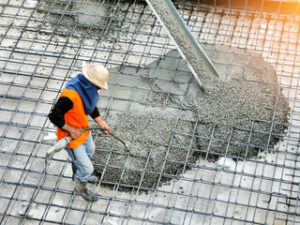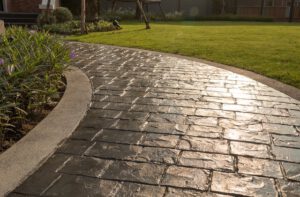Concrete Contractors are specialized professionals who handle all aspects of concrete construction projects. They ensure that concrete structures are strong, durable, and built to last. They also provide maintenance and repair services for existing concrete structures.

A good contractor has many qualities, including technical knowledge, attention to detail, and communication skills. They are also familiar with building codes and regulations.
Concrete contractors may not capture the attention of the media as much as designers and architects do, but their role is crucial in bringing construction visions to life. They specialize in transforming raw materials into durable, aesthetically pleasing, and long-lasting structures. They also bring specialized knowledge and expertise to the table, which ensures that concrete projects are completed quickly and accurately. There are several key factors to consider when selecting a Concrete Contractor, including their experience level, project timeline, cost estimates, quality assurance practices, change management, credentials, and communication plans.
A reputable Concrete Contractor has extensive hands-on experience in the industry and should be able to provide references from past clients. These references can give insight into the Contractor’s work ethic, reliability, and professionalism. You should also ask to see their portfolio of previous projects. This will help you determine if their style and methods are a good fit for your project.
The first question to ask a potential concrete contractor is how long they have been in business. Experienced contractors have a strong understanding of the concrete industry and are able to foresee any issues that may arise during the project. They are able to use this expertise to resolve problems quickly and efficiently, saving time and money.
Another important factor to consider is whether the contractor has training for the type of concrete installation you need. Training teaches contractors how to use specific products and tools in the correct manner, which helps them achieve a better result. It is also a good idea to look for contractors who are members of trade associations, which shows their commitment to the industry and an ability to follow industry standards.
A reliable Concrete Contractor should have a solid track record of working with different concrete types, as well as an understanding of different construction techniques and the requirements for each type. In addition, they should be able to use innovative solutions and advanced technology to improve the quality of their work. This is important, as it ensures that your project will be completed on schedule and within budget.
License
Concrete is a versatile material that can be used to construct many different types of projects. This versatility makes it an essential part of construction, and as a result, there is a need for skilled contractors who can handle the work effectively and safely. Contractors who specialize in concrete work have a unique set of skills and knowledge that sets them apart from general builders.
In order to be licensed as a concrete contractor, you must meet certain requirements. These may include experience, insurance, and a license to conduct business in your state. Licensing processes differ across states, so it’s important to research the specific requirements for your region. If you’re unsure of what requirements apply in your area, consult with local building departments or regulatory authorities for guidance.
The process of becoming a concrete contractor requires extensive work experience and the ability to pass a comprehensive exam. Applicants can prepare for the exam by taking educational courses and joining study groups. Several online resources are available to help prepare candidates for the exam, including sample questions and practice tests. Applicants should also review the exam content to ensure they are familiar with construction codes, laws, and safety regulations.
Depending on the state, some licensing boards will waive experience requirements for individuals who have completed college classes or taken professional development courses in the field of construction management. In addition, military service can be used to satisfy some experience requirements. Moreover, most states have policies to recognize academic work and apprenticeship training as qualifying experience.
Many people choose to become a concrete contractor because of their passion for the craft. It’s more than just a job; it’s a way to create something that is enduring and beautiful. However, the industry is always evolving, and it’s vital for contractors to keep up with new trends and techniques.
It is highly recommended to hire a licensed contractor for any construction project, as this will prevent costly mistakes and legal issues down the road. In addition, it will protect homeowners from liabilities. Licensed contractors must carry liability insurance and bonding, which provides financial protection for homeowners in the event of an incident.
Insurance
The right insurance can protect you from the risks that come with the work of a Concrete Contractor, such as third-party injuries and property damage. It can also help you comply with regulatory requirements. However, finding the right policy requires a thorough review of available options and your unique risk profile. The best approach is to work with an experienced insurance provider who understands the specific liabilities of the concrete contracting industry. When comparing providers, make sure to examine their reputation, customer service, and policy options. In addition, consider the company’s experience in the concrete industry, as it will better understand your business needs and can customize a policy that suits your budgetary constraints.
Concrete contractors have a number of liability concerns that need to be addressed, including workers’ compensation, general and professional liability, property insurance, and commercial auto insurance. Workers’ compensation coverage provides coverage for on-the-job injuries, and is a legal requirement in most states. General and professional liability coverage provides protection against claims arising from errors, omissions, or negligence in the services you provide. This type of insurance may also cover legal fees in the event of a lawsuit against your business.
Property insurance covers the costs associated with any damage to a client’s premises or equipment while the contractor is working on-site. Additionally, the policy may provide coverage for the loss or theft of equipment. Concrete contractors rely on their equipment, and a loss or theft of this equipment can significantly impact the company’s operations. Inland marine coverage, which is part of a general commercial insurance package, helps cover the cost of any tools and equipment that are mobile.
Ask the Concrete Contractor about their warranty and post-project support. A comprehensive warranty can be an indicator of the quality of workmanship and can give clients peace of mind. In addition, it’s important to establish a clear payment structure and schedule. This can avoid any misunderstandings and ensure that the project is completed according to plan. It’s also a good idea to find out about any additional charges that may be added to the final bill.
Reputation
Concrete work is a significant investment, so it’s important to choose the right contractor. The best way to determine if a contractor is the right fit is to request references from previous clients and visit their website or Facebook page for examples of their work. This will give you an idea of their craftsmanship, professionalism, and communication skills. A contractor should also be able to provide you with a clear breakdown of the project’s estimated timeline and cost.
Ensure the contractor you choose is licensed and insured for your protection. It’s also a good idea to check whether they’ve earned any certifications from industry organizations. These credentials prove that they adhere to industry standards and follow best practices, which will increase the quality of your project. You should also inquire about their safety protocols and their willingness to accommodate any unexpected challenges that may arise during the project.
An experienced concrete contractor will be able to provide valuable insights that will help you achieve the desired results for your residential or commercial construction project. In addition, they will be able to work within your budget and ensure that the project meets your specifications. They can also help you navigate complex construction processes and comply with local council requirements.
A reputable contractor will have a comprehensive portfolio of previous projects that showcase their skills. Ideally, these projects should be similar to yours in scope and objective. If your project requires specialized concrete services, such as decorative or stamped concrete, it’s essential to select a contractor with extensive experience in these areas.
It’s also important to ask about the contractor’s preferred material suppliers and concrete mix designs, as these will have a significant impact on the final outcome. You should also discuss any unique design or aesthetic considerations for your project, such as surface finish, color, or texture. An experienced contractor will be able to recommend the best materials and methods for achieving your goals.
A reputable concrete contractor will have excellent time management skills and deliver high-quality work on-time. They’ll be able to communicate clearly with you and keep you updated on the progress of your project, as well as any issues that may arise during the process.
